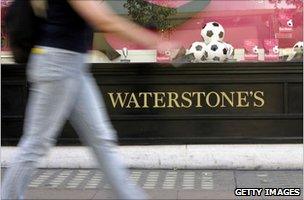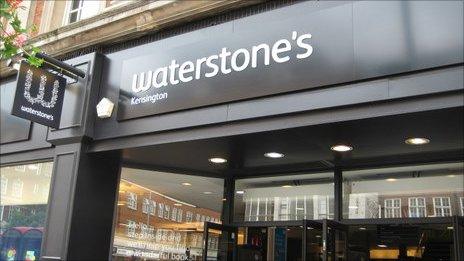HMV thrown lifeline by banks
- Published
- comments

The Pensions Regulator will also have its say on Waterstone's future
Sometimes good news comes in a form that doesn't really look like good news - and so it is with HMV's statement on trading and the sale of Waterstone's this morning.
Although some would say that HMV has sold the UK's largest high street book retailer for a knock-down price, and the group's latest trading results are frightful, I have learned that the group expects to reach agreement with its banks on a new £200m (or so) borrowing agreement within the next two weeks.
Or to put it another way, HMV isn't going bust (or at least not this year).
Its banks, led by Royal Bank of Scotland and Lloyds, have decided in principle to back the plan of Simon Fox, HMV's chief executive, to revive HMV stores by switching more of their stock into electronic goods, especially tablets (see my note, "Can HMV reinvents itself", for more on this).
That rescue plan also involves the closure of 40 HMV and 20 Waterstone's stores, of which more than half have already been closed, together with the sale of the Waterstone's business, to reduce debt and the complexity of the group at this challenging time.
Formal agreement from the banks is expected by early June, when HMV will send a document to shareholders detailing the reconstruction of HMV and asking for their approval.
The assent of the Pensions Regulator is also required, because the single group pension scheme will henceforth be funded by an HMV that no longer contains Waterstone's - so the Pensions Regulator has to be persuaded that HMV isn't being weakened by the sale of Waterstone's.
'Take the tablets'
It would be difficult, I think, for the Pensions Regulator to block the disposal of Waterstone's - because the alternative, almost certainly, is that HMV would collapse into administration. And it is hard to see how HMV's current and future pension would benefit from the death of HMV.

HMV hopes to restore some financial confidence in the business
So much for the good news. The rest of what HMV had to say wasn't exactly cause to crack open the bubbly.
Like-for-like or underlying sales at HMV in UK and Ireland continue to shrink at a scary and accelerating rate. So in the 10 weeks to 1 January, they were down 14.1%. Since then, in the 17 weeks to 30 April, the shrinkage has been 15.1%
Or to put it another way, HMV's problems run a lot deeper than that horrendous pre-Christmas snow which was blamed by everyone from ministers to business leaders for the weakness of the consumer side of the economy at the end of last year.
But in the six stores where HMV has been experimenting with its new tech-heavy format - all those bloomin' tablets - sales were only a bit worse than flat. Result!
Here's the bad joke: for HMV it's plainly a case of keep taking the tablets.
As for Waterstone's, the Russian purchaser, Alexander Mamut, looks like he may be getting quite a bargain, something a bit better than Waterstone's staple twofers.
Viable future?
He is paying cash of £53m for a business that was turned round by Mr Fox and his team in the past year. So in the 12 months just finished Waterstone's made a trading profit of somewhere between £10m and £12m, I understand, up from £2.8m in the previous year.
The Russian plutocrat gets 296 stores and gross assets of £283m that are free of debt or any UK pension liability. And annual sales of Waterstone's are about £500m.
So HMV's woes may well turn into Mr Mamut's good fortune. That said, book retailing also faces formidable structural challenges from the rise and rise of e-books, online retailers and supermarkets that sell best-sellers.
But if the sale of Waterstone's is what it takes to persuade HMV's banks to provide the group with the finance necessary for its survival - and therefore protects some 13,000 jobs - then few will doubt that it was necessary.
Here is where HMV hopes that the magic of restoring financial confidence will make all the difference. In just a few months, HMV's net debt has shot up from £130m to £170m, in part because some of HMV's suppliers have been demanding cash for their goods, rather than supplying the DVDs, CDs and the rest on credit.
With any luck, once they see that the banks are standing behind HMV, then HMV will be able to trade with them again on normal credit terms. Which would take HMV out of the vicious cycle of rising debt and rising financing costs.
Now for the genuinely hard bit, after all that slog for HMV's senior executives led by Simon Fox in winning round the banks. All they have to do is deliver a recovery in sales via an almost total reinvention of the look and stock of their stores, so that next year or the year after HMV's creditors don't change their minds about the group having a viable future.
- Published20 May 2011
